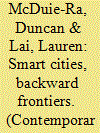| Srl | Item |
| 1 |
ID:
177097


|
|
|
|
|
| Summary/Abstract |
This paper investigates the determinants of smart energy tracking app usage by citizens residing in French cities. Our framework is inspired by the extant strands of literature on smart cities and smart home technology adoption, but also contributing to them as smart energy applications reveal specificities that need to be incorporated; the latter include, for instance, the distinction between adoption and frequency of use, or the consideration of additional determinants such as privacy or environmental concerns. For our study, we build an original survey and rely upon citizen-level data, testing a Zero-Inflated Ordered Probit (ZIOP) model which allows to differentiate between adoption of the smart energy app and its frequency of utilization. Our empirical findings reveal how the drivers related to smart city characteristics mainly affect the decision of adoption of energy tracking apps. Conversely, the more individual characteristics related to the perceived benefits of using energy tracking apps, dwelling type, and privacy concerns, primarily affect the frequency of utilization. Our results bear policy implications on the issue of privacy, premising additional research on energy challenges in the utilization of energy apps in smart versus non-smart environments.
|
|
|
|
|
|
|
|
|
|
|
|
|
|
|
|
| 2 |
ID:
146012


|
|
|
|
|
| Summary/Abstract |
The impact of globalisation and industrialisation has been a subject for research around the globe due to the huge paradigm shift caused by them. Such phenomena are also a cause of concern as cities consume close to three-quarters of the world’s natural resources and generate three-quarters of its pollution and waste. There is a need for the cities to get smarter through the application of innovative solutions to address large-scale urbanisation challenges and find new ways for creating liveable, competitive and self-reliant cities.
|
|
|
|
|
|
|
|
|
|
|
|
|
|
|
|
| 3 |
ID:
168568


|
|
|
|
|
| Summary/Abstract |
India's Smart Cities Mission (SCM) launched in 2015 has awarded 100 smart cities nation-wide, proffering funds, compulsory corporate partnerships, and new configurations of urban governance. Perhaps most striking are the ten smart city bids from Northeast India, a region shaped unevenly by separatism, military occupation, and heavy economic dependency. Smart cities in the Northeast have been awarded with key exceptions to SCM rules. We take this to be a largely unprecedented experiment in digital urbanism in what Dunn and Cons (2014. “Aleatory Sovereignty and the Rule of Sensitive Spaces.” Antipode 46 (1): 92–109) label ‘sensitive space’. Through a critical reading of the 10 smart city bids from the Northeast we make three arguments. First, despite the techno-utopian rhetoric, the primary aim of the SCM is integrating frontier space into national territory. Second, the extension of the SCM to the frontier accelerates the recalibration of the frontier into a market for corporate capital under the necessary stewardship of the Indian state, though the role for customary authorities in these arrangements is unclear. Third, with few other avenues for revenue generation and in response to perceptions of neglect, local authorities have used SCM bids to request conventional infrastructure rather than digitally networked projects.
|
|
|
|
|
|
|
|
|
|
|
|
|
|
|
|